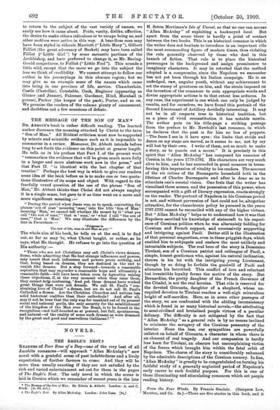THE MESSAGE OF THE SON OF MAN.* DR. ABBOTT'S book
is rather difficult reading. The learned author discusses the meaning attached by Christ to the term "Son of Man." All Biblical criticism must now be supported by minute and scientific evidence such as it is impossible to summarise in a review. Moreover, Dr. Abbott intends before long to set forth the evidence on this point at greater length.
He tells us in his preface that Part I. of the present work "summarises the evidence that will be given much more fully in a larger and more abstruse work now in the press," and that Part II. "is identical with the last chapter of that treatise." Perhaps the best way in which to give our readers some idea of the book before us is to make one or two quota- tions illustrative of its scope and object. With regard to the fearfully vexed question of the use of the phrase "Son of Man," Dr. Abbott thinks that Christ did not always employ it in a single sense, but gave to it as time went on a more and more significant meaning
"During the period wen Jest's was, so to speak, converting the phrase 'son of man' meaning 'man,' into the title 'Son of Man' meaning Man; we cannot tell whether He meant by it what you call"the son of man,"' that is man,' or what I call "the son of man," ' that is 'Man.' Wo may illustrate the difference by the line in Paracelsus,— , • Progress is
The law of life, man is not Man am yet.'"
The whole aim of his book, he tells us at the end, is to find out, so far as may be, what Christ taught, or rather, as he says, what He thought. He refuses to go into the question of His authority
"Those who are not Christians may call Christ's views dreams. Some, while admitting that He had strange influences and powers, may assert that such influences and powers prove nothing, and that, being based on dreams, they are destined in the end to vanish like dreams. But a step forward—towards a reasonable aspiration that may engender a reasonable hope and ultimately a reasonable faith—will have been taken even by Agnostics raising these objections, if at the very moment when they raise them, they cannot help confessing, 'And yet these dreams have worked great things that were not dreams. We call St. Paul's "con- straining love of Christ" a dream but we do not call St. Paul's Cathedral a dream. Are the Christian Churches and nations less solid historical realities than their cathedrals ? And after all, may it not be true that the only way for mankind out of its present social and national perils, the only security for the establishment of the kingdom of the Man over the Beast, is to be found in the recognition—not half-hearted as at present, but full, spontaneous, and' natural—of the reality of some such dreams as were dreamed by the great and good and marvellous Galilsean? ' "










































 Previous page
Previous page